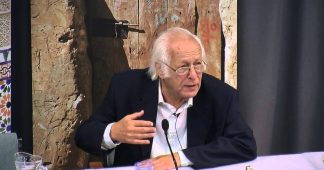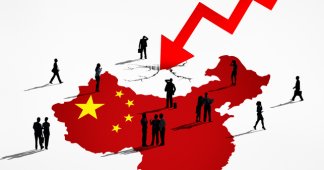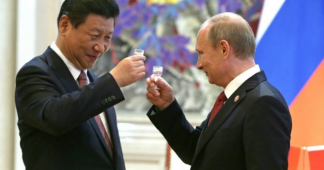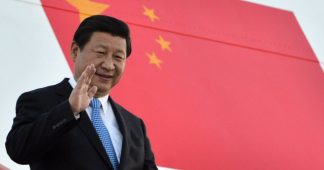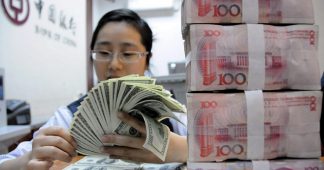World acclaimed Marxist thinker Samir Amin dies
The financial facets of globalization
Globalization has three facets which consist of : (i) free global trade, (ii) free international capital real investments, (iii) free financial transactions on financial international markets (transfers of liquid capital including transactions on foreign exchange). Assuming also that all those markets are really open, transactions “transparent” , and therefore competition an actual reality. This set of assumptions hides some actual major realities (see later).
1. China’s reforms as of the year 1978 started with the opening of its internal system of production to the rule of market mechanisms, simultaneously open to global trade. Liberalization of capital investments followed also in the frame of a globalized world: foreign investments were invited to be established in China, and later Chinese investments to operate out of China. But, until now, China has not integrated into the global monetary and financial system: banks operating in China are exclusively State Chinese banks, and the rate of exchange of the Yuan is decided by the Central Bank, i.e. the government.
That system has been successful in the sense that it has boosted growth of GDP, and therefore opened a possible perspective of “catching up” resulting in making China the economic power number one in the World.
2. A step ahead is now considered for further reform, called in economic jargon “the opening of the capital account”, which means: (i) allowing foreign banks to operate in China, in competition with Chinese public or private banks; (ii) removing the fixed rate of exchange of the Yuan and allowing the free international market to operate, generating a flexible, fluctuant rate.
3. Simultaneously China criticizes the present system of globalization, considered in all its facets to be submitted to the “hegemony” of major powers, the USA in particular. This view implies that the economic facets of globalization are also related to political and geostrategic forces operating in the real world. That relation does indeed recognize an important reality, often ignored by economic professionals. China struggles for “another pattern of globalization” –“non hegemonic”.
4. Therefore the proposal to move into global financialization should be looked at carefully and answers given to the following set of questions: (i) Would such a movement boost growth in China, or rather would represent a handicap to its continuing to remain high growth? (ii) Would a fluctuating rate of exchange of the Yuan give more chance to China becoming a global financial, really big actor, able to compete successfully with the other major financial powers, in particular the USA and the US dollar? (iii) In any case is it wise to believe that the Western major powers can tolerate China becoming the major World economy, and accept China as member of the “club” of major financial operators? Or the political geostrategy of the West, USA in particular, will plan their action in order to have the Chinese project of catching up end up in failure, and use all means, economic, financial and eventually military, to that end?
II.National control of the capital account: a weapon in Chinese hands effectively used with great success until now
1. Who controls the so called global integrated money and financial market?
Deng Xiaoping said that you should start from looking at actual facts. It is exactly what the conventional professional “economists” – all of them, including the Chinese “experts” trained in the USA and brainwashed – do not do.
a) Conventional economists develop “theories” with respect to what they call “free and transparent competition”, including competition in the global financial market, based on a totally imaginary world which has nothing in common with the really existing capitalist system. They all assume: (i) that millions of “individuals” operate on the market; (ii) that these are “rational” – sharing “rational expectations” with respect to the movements in the markets; (iii) that they benefit from a correct transparent information to be rational in their decisions.
None of these assumptions reflect the real world: contemporary capitalism is ruled by a handful of gigantic oligopolies (financial monopolies) which control production of goods and major services, banks, insurance companies, etc., and have subordinated those actors which seem independent (farmers, small and medium size enterprises) to the status of sub-contractors thus pumping the surplus produced by those to the benefit of growing monopoly rents.
b) With respect to the monetary and financial integrated global market, some 20 giant banks (all of them based in the USA and the major capitalist countries of the “triad” associating the USA, Europe and Japan) control more than 98% of the gigantic volume of transactions operated on that market (trillions of dollars, a figure which represent hundreds of times more than the volume of transfers needed to meet international trade and flows of capital invested in real production. This is not an open market, allowing free and fair transparent competition.
c) Simultaneously, conventional economists ignore the tight relations which link the targets of financial transactions to those of the geostrategy developed by the USA and its subordinate allies (Europe and Japan). These links reflect the global political strategy of this “collective imperialism of the triad” whose target is to maintain its exclusive control of the whole planet, through the use of all means –“economic”, and more specifically financial, political and military. History and analysis of the contemporary events illustrate these behaviors.
2. Control of the capital account by the Chinese authorities has been decisive to ensure the success of China’s reforms.
a) Chinese national banks have successfully financed the emerging of hundreds of thousands of small competitive enterprises, private and public (the so-called Township and Village Enterprises, TVEs). Foreign giant banks established elsewhere in the South have never made such a choice; they have restricted their support to Multinationals, thus eventually helping to create networks of subordinated local small and medium size sub-contracting enterprises, pumping out the surplus produced to the benefit of financial monopoly rents. China’s reforms, thanks to the control of the capital account, have been able to ensure that this surplus remains in China and finances continuous growth.
b) China’s pattern of integration into globalization has allowed it to formulate conditions for foreign investments with respect to sharing the property rights with Chinese private or public capital, transfer of technologies, transfer of profits, etc. Such conditions would not be tolerated any more if China integrates the financial global market system.
c) Does the system of “market fluctuating rates of exchange” have “stabilized” economic growth?
Flexible rates of exchanges have been established as a system replacing Bretton Woods system of relatively stable fixed rates by unilateral decision of the USA in 1973, accepted by their partners of the Triad (Europe and Japan), and imposed on almost all countries of the South.
What are the results after 50 years of such practice?
First: the new system has not produced stability, even in relative terms, with respect to the rates of exchange of major currencies (dollar, yen, sterling, mark, euro). On the contrary, we have seen wide fluctuations (the dollar for instance moving to one and a half and then to two thirds the price of the euro within some months). Such fluctuations do not reflect changes in the competitivity of the concerned countries (levels of competitivity, commanded by unequal growth of productivity, are slow). They have been the result of an open market for speculative financial investments; these have been made necessary by the continuous growth of the surplus of profits which cannot be reinvested in the expansion of the productive system.
Second: with respect to the rates of exchange between the dominant currencies (dollar, sterling, yen, euro) and the currencies of almost all countries of the South, the new system has generated continuous devaluations. Such results were targeted as the means for finance monopoly capital to “buy” real assets in the South at very cheap prices (factories, mines, forests, land, banks, insurances, etc.). It therefore has not boosted growth, but amplified plunder.
Let us compare in this respect the results for China and India (which has moved from a system of limited control of its capital account to a full opening).
China’s GDP for 2015 in terms of equivalent purchasing power: 18% of the global GDP; in current dollars: 16% (a small difference). India’s GDP in purchasing power: 8%; in dollar: less than 2%. The difference is enormous and reflects the successful strategy of imperialist powers to annihilate the competitivity of millions of Indian producers and reduce them to the status of sub-contractors whose surplus is pumped to the benefit of western monopoly capital.
China moving to a system of flexible “market” rates would produce exactly similar results: the destruction of millions of competitive Chinese producers; and therefore the end of the dream of catching up. This is exactly the target of Western Monopoly Finance Capital. The argument that “smart” policies of Chinese operating on this integrated global market could avoid such results does not hold: are Indians stupid? Then why have the Indian leaders accepted such a deal? Simply because a handful of subaltern associates with Foreign Finance Capital have gathered enormous fortunes out of their complicity. Such a practice has a name well known in Chinese Marxism: a comprador class, such as that which had been associated with British Finance Capital when it created the famous HSBC (the Bank established to finance the Opium Wars!).
d) It is said that flexible rates reduce the costs of transaction and therefore favor the growth of exports. This is a fallacy: the volume of exports results from other more important factors (the nature and volume of productions). Moreover, why should China pursue continuously the target of expanding exports at a rate higher than its GDP growth? This choice is absurd: China should rather shift to more priority to its internal market thus reducing its vulnerability, achieving better welfare, and correcting regional imbalances.
Does flexible rates widen the margin of choices for internal economic policies? On the contrary, it restricts that margin since national policies have to comply to the only choices allowed by major powers. The European case provides a good example of such a restriction of the margin of manoeuver of its members.
e) With respect to the growing Chinese export of capital to replace the exclusive investment of China’s surplus in US bonds, the vulnerability of buying real assets out of China (companies, mines, agrarian land) cannot be avoided as long as China cannot protect its properties from menaces of military interventions from the USA. Joining the financial global system does not reduce this vulnerability.
f) Thanks to the control of its capital account, China has not suffered from the 2007/8 financial crisis. Other countries in Asia, integrated in the monetary and financial market, have been devastated by this crisis. Foreign Finance Capital has been able to transfer the costs of the crisis to those countries, their currencies devaluated, making possible for Foreign Banks in Indonesia to “buy” at very cheap prices forestry (turned into palm oil production), mines, etc. Other similar financial crises produced by the explosion of bubbles are expected in the short visible future. If in the meantime China has moved to the new opening suggested, it will suffer enormous devastations and plunder of its wealth.
3. Can China be accepted as a member of an enlarged imperialist new collective associating four partners instead of the three members of the Triad?
a) I am convinced that the Triad with USA in the lead do not intend to recruit new members, but devote all their efforts to maintain their exclusive control of the planet. It would be very naïve to believe that they will accept China’s project of catching up.
Russia provides an example of such right to be admitted in the restricted club being denied to all others. Yeltsin gave up all the assets in his hand and simply fully restored capitalism. Nevertheless Russia was denied the right to be admitted in “Europe” and NATO; the strategic target of the West has been to reduce Russia to a provider of raw materials and possibly subordinate what would remain of its industries to the status of sub-contracting.
b) The military menace against China is already visible. North Korea and Iran have been chosen as targets for eventual military intervention by USA, Europe, Israel, Japan; the Dalai Lama and the Ouigour Islamic fundamentalists are supported with a view to start from there the dismantling of China.
c) What about economic sanctions in the meantime?
The USA has given to itelf an extraordinary privilege: to deny legitimacy to international law and submit it to the priority of the US law. Therefore when it decides sanctions against a country (Iran in this case), it simultaneously compels the rest of the world to implement these sanctions; otherwise it extends punishment to its associates (including Europe). Will Europe accept? My answer is yes, in spite of the damages their companies and banks suffer from.
Yet, as long as China keeps away from financial globalization, sanctions against it remain limited in their effectiveness. Example: when a US company operating in the field of informatics withdrew, China replaced it immediately by a British competitor. If the USA takes sanctions against some Chinese exports, China can respond by similar sanctions. This immense advantage would be annihilated in case of foreign banks being allowed in China.
Conclusion:
There is no need to hurry and join the financial globalized system, which is the only guarantee for Washington to maintain the dollar’s exclusive privilege. Moreover, that whole pattern of globalization is already in deep crisis, which offers an opportunity for outsiders. Remaining out opens room for a possible construction of alternative independent regional systems with the perspective of creating better conditions for the advancement of an alternative non hegemonic globalization.
Simultaneously world capitalism is incompatible in the long run with the existence of non capitalist entities, and even just relatively independent entities.
Remaining out of financial globalization is an important weapon in your hands; do not offer the weapon to your enemy!
ANNEX: The Currency War
Pambazuka; Oxford University, UK; interview 25/11/2010
PAMBAZUKA NEWS: There has been much publicity about the so-called ‘currency war’ arising from the discussions at the recent G20 meeting. Can you explain what is meant by currency war?
SAMIR AMIN: The discourse, the rhetoric, on the currency war is very superficial and even misleading. As everybody knows, what is being said is that the Chinese Yuan is undervalued and that is bad for the global equilibrium. It is as if China is mainly and exclusively responsible for what is bad in the system. Everyone keeps saying that the Yuan is undervalued. Now this is not the real problem. The real problem is the imbalance between the power of the US – that is of the US dollar – and the non-power of the other so-called partners (and therefore are really non-partners) in the integrated global monetary and financial system and market as it presently exists.
The real question is that imbalance. That is obvious when you hear the US establishment speaking. They say, and they repeat it with arrogance: the dollar is our money and your problem. That is, the US keeps in its own hands the tools for managing its own currency according to its own needs and targets, good or bad. That is indeed what the US Federal Reserve does, which is its central bank – – ruled by the treasury. The US Federal Reserve has the tools in hand for running its monetary policy as it considers it should be, with no regard to anyone else. So, the Federal Reserve fixes the rate of interest; it is not the banking system that does that. Whether they fix it high or low in order to serve their targets, whether this is effective or not, they have this right, and they keep hold of that right. And they keep also the right of the Federal Reserve to buy treasury bonds that is to cover, eventually, a budget deficit of the US by inflation, by printing money.
These are the normal rights of a sovereign state, and they keep those rights. Whatever they decide freely and independently has of course effects upon the other partners. It can be damaging, in many cases, on the others. But they don’t care. They say, well this is our money. If you have difficulties with it, this is your problem and you should deal with your own problems.
If this principle is acceptable for the US, then it has to be acceptable for all other countries. There is a basic and fundamental principle of international law which is equal sovereignty of states. That is, if the US keeps for itself those rights, then the same holds for other countries. And that is exactly what China is doing. China behaves exactly like the US, it has kept hold of the tools to manage its monetary policy according to its own targets and needs. It is the central bank of China, which is state controlled, which decides the rate of interest in China and which decides also – which it is allowed by law to do – to buy Chinese treasury bonds that is to cover by inflation an eventual deficit of the Chinese state budget.
There is no deficit at the moment, but the point is that they keep that right. China is not doing anything different from the US. It is doing exactly the same. It has kept all its sovereign rights, just as the US has also kept its sovereign rights.
So the Chinese would be absolutely right to say to the Americans: if the dollar is your currency and our problem, so equally the Yuan is our currency and your problem! So, you (the US) have to solve your problem, and not to put the blame on us.
Additionally the problems of the US are not the result of China’s doing, they are the result of the failures of the US in many areas related to the governance of corporations, education and R and D, financial management etc. And therefore there is no reason why China should accept the dictates of Washington, and frankly it is not accepting them. But the propaganda continues incessantly – it is China, it is China, it is China.
What is very curious in the present state of affairs is that, unfortunately, no other country other than China retains those rights. No other major partner (of the G20) has fully retained those rights, although some of the emerging countries such as India and Brazil have done something to that effect. Instead, they have generally accepted the dictates of the US.
Indeed, ‘Euro land’ has castrated itself by the Maastricht and Lisbon agreements. It has adopted for itself curious rules for the running of its so-called European Central Bank – which in effect is not a Central Bank (since there is no European State which has the responsibility to run it). It is not allowed to lend to the member States, whereas the US Federal Reserve and Treasury is indeed allowed to lend to the State, just as the Chinese Central Bank is allowed to lend to the State.
The reason for that unbelievable attitude, again, is that there is no European State and that the Union does not trust the National European States. The decision not to lend to the States therefore proceeds from the curious belief that the exclusive role of the Central Bank is to prevent at any cost any dose of inflation! The rule of ‘no inflation’ has been made an absolute principle. Prodi, the former chair of the European Union, said this was idiotic. And indeed it is. Similarly, the European Central Bank does not decide on the interest rate. It leaves it to the so-called ‘market’. Effectively this means leaving it to the major banks, which are the European as well as American, and even Japanese banks operating in Europe. Thus the European Central Bank has in effect castrated itself. So, the Europeans are not in a position to tell the Chinese that it is their fault. It was not the Chinese who set the rules of the European Central Bank! If the rules are silly, idiotic, that is the fault of the Europeans.
As for the other partners, that is Great Britain and Japan, they have accepted, and continue to accept, to align themselves behind the US, and to leave to the US the management of the global integrated monetary and financial system. In other words, they have accepted the fundamental imbalance in favor of the US. This is also their problem: if they have decided to follow the dictates of the US, why should they complain that China does not! The Europeans and Japanese have the right to manage their own currency just as the US and China do. But they have made a political decision to align themselves with the US. Therefore any consequences of this choice of theirs is not the responsibility of China.
It is important to understand that this is the central problem. The problem is the global integrated monetary and financial system, ruled as it is by the dollar, that is ruled by the exclusive prerogative of the US Treasury and Federal Reserve, of the US state. This is not acceptable. That is the problem. The problem is not the exchange rate of the Yuan or that of the Rupee or any other currency. Absolutely not.
PAMBAZUKA NEWS: So what are the solutions possible?
SAMIR AMIN: There are three sets of possible answers to the real problem – not the false problem of flexible exchange rates of currencies – but the real problem of the global integrated monetary and financial system.
First, for those who assume that the system is not so bad, and who accept that the US dollar should continue to be effectively the major, if not absolutely the exclusive international currency, the idea would be to restore the system as it was before the 2008 financial breakdown along with, perhaps, some minor regulatory reforms (most of which are essentially more cosmetic and rhetorical than real).
This is exactly what the Stiglitz Commission and the Stiglitz report aim at. It accepts that the US dollar should remain the almost exclusive international currency (with some minor concessions). But it also accepts the right of the US government to manage the currency exclusively and on its own. As for everyone else, they have to adjust to the US dictates. This is, of course, not acceptable, especially for the South. If the Europeans, the British, the Japanese accept it that is their business. But I don’t see why the Asians, the Latin Americans, the Africans should accept it. So, that is the Stiglitz style solution. And it has completely failed. Nobody pays attention to the Stiglitz Report, which has been dropped in the waste-basket, and nobody really cares about it. It has not convinced the partners, especially from the South. Even the North does not give any consideration to the recommendations of Stiglitz.
The second set of solutions is theoretically ideal. This would involve establishing a new, integrated global monetary and financial system not ruled – as it is at the moment – by the US dollar and under the control of Washington. A different system should be imagined instead. That would mean inventing or creating a new international currency unit which would, of course, be clearly defined by a basket of major currencies – the dollar, the Euro, the Sterling, the Yen, the Yuan, and possibly some other currencies.
The proportions for each component would be that which corresponds to the contribution of each State or group of States to the global trade. That is, close to the SDR (Special Drawing Rights) and even closer to the ‘bancor’ that Keynes imagined in 1945. That would be a realistic international currency, that of course would need to be properly managed. New rules would have to be invented to that effect.
Among those rules needed, a relation to gold cannot be avoided. That is to say, the system cannot be stabilized if there is not a fixed stabilizer. The new international currency unit has to be defined as equivalent to a precise quantity of gold. The gold exchange standard is needed, but not the gold standard as it has been in the Bretton Woods period, that is from 1945 until 1971, when the convertibility of the dollar into gold was suppressed by unilateral decision of the US. During these 30 or so years, in effect it was correct to say that the dollar was as good as gold. But since the 1970s, this is no longer the case.
This of course would be the ‘ideal’. But this ideal is impossible. It is impossible because it is rejected by the US and by its subordinate allies – Europe and Japan. In other words, it is rejected by the Triad. They don’t want it. And if they don’t want it, there is no global consensus possible. And if there is no global consensus, there can be no ideal solution. So running after an ideal solution would mean writing endless papers with almost no effect. It is politically rejected from the very start by the US, Europe and Japan.
Thus, there is only the third alternative. We – that is, the countries of the South, emerging as well as the others – should seek to establish arrangements between ourselves. It would be nice if we can achieve an arrangement across the global South, but this is difficult for the time being. But we could construct regional arrangements independently from the rules governing the global system. We leave the global system as it is, we leave it to the Americans to complain with the Europeans – we don’t care about their problems. The idea of such a regional arrangement has already been initiated but actual achievements in keeping with that idea are still extremely limited.
This is what the Chinese had in mind when they established the Organization of Cooperation known as the Shanghai group, as well as the initiatives that China took in the area of financial and monetary arrangements with some of the countries of the ASEAN region in South-East Asia. This is also what some of the Latin American countries have imagined when they established the ALBA project and the ‘Sucre’ currency unit.
Much more needs to be done and must be done. This is the solution and the only viable solution. These various arrangements in different parts of the South could eventually be inter-related at the level of a global South. We have to move independently.
We have to accept that since no global consensus is possible, we in the South have to act independently and as far as possible together. The last meeting of the G20 has proved once more that there is no possible global consensus. The attempt of the G7 to co-opt first the Russians into the G8, and then some of the emerging countries – China, Brazil, India and some others – into the G20 has essentially failed. We are polite. Our governments go to these G20 meetings, but there is no consensus produced out of its meetings. So, we have to take independent initiatives.
